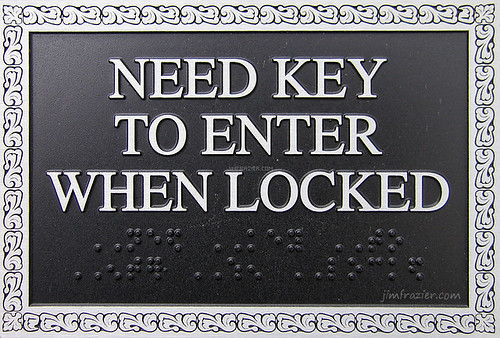
Education and training on state sales and use taxes.
We focus on the laws, as well as your systems, policies and procedures to assure compliance.
There are a couple of jokes, too.
Wednesday, November 27, 2013
Wednesday, November 20, 2013
Can I just pass on the tax?

A reader today posed this scenario.
There is an obvious question hereMark is the manufacturer and sells to the retailerRhonda is the retailer who sells to the customerCalvin is the customerApparently, Mark is charging Rhonda sales tax.Rhonda therefore incurs the cost of the sales tax.Rhonda would like to pass on this cost to her customer, Calvin.Can she?
Why can't Rhonda buy from Mark for resale? This would seem to be the obvious and legal solution. Particularly since Rhonda is required to charge Calvin tax if the sale is taxable and she has nexus in the state.
Two exceptions spring to mind
It's possible that this is a drop shipment and Mark has to charge Rhonda tax but Rhonda doesn't have a way to charge Calvin tax since she has no nexus in the delivery state.
It's also possible that Rhonda is a contractor. In most states, she pays tax to her vendors for her building materials but doesn't charge tax when she bills Calvin for the job.
These are the obvious and common exceptions - there are more.Other than the above exceptions, Rhonda should be buying for resale and charging tax, if the sale is taxable.
However, if she is incurring sales tax for some reason (like the two listed above) and she can't pass it on, or is not allowed to pass it on, then it's a cost of doing business, and she has the ability to fold the tax into the price of her goods. The only obvious restrictions I can see are:
Rhonda doesn't price herself out of the market and
the customer agrees to the priceNote that these are not sales tax law restrictions...this is just business. Rhonda can set her price at any point she wishes, as long as the customer agrees.
However...
Rhonda generally can't charge Calvin something called "tax" in a state where she isn't registered. Rhonda might think this is a way to recover the money from the customer without having to negotiate a new price. Unfortunately the law generally requires that you must be registered in a state before you charge that state's taxes. In addition, if she were to be audited, the state would ask her why she has not remitted that "tax" money to the state. If Rhonda needs to show a charge on the invoice, call it a "we're going to hold you upside down and shake money out of your pockets" surcharge. But don't put the word "tax" on Rhonda's invoice to Calvin.
And if Rhonda is making a taxable sale to Calvin, then she is required to charge Calvin tax, if she has nexus in the state. And she should obviously be buying for resale.
Bottom line
If Rhonda is making a sale to Calvin that is taxable and she has nexus in the state, she should be charging Calvin tax.
If the vendor is charging her tax, she should figure out why she can't buy it for resale.
If it's some other situation where she's incurring tax as a cost, she can't pass it on as "tax." But she can fold that cost, like any other cost, into her price.
Geez, this stuff is complicated! If you're reading this and desperately waving your hand because Jim missed something, I know. But the more holes I fill in, the less understandable this is. Suffice to say, it's messy.
And don't even get me started on absorption
The Sales Tax Guy http://salestaxguy.blogspot.com
See the disclaimer on the right.
Don't forget our upcoming seminars and webinars. http://www.salestax-usetax.com and there's more sales tax news and links here http://salestaxnews.blogspot.com
Picture note: the image above is hosted on Flickr. If you'd like to see more, click on the photo.
Tuesday, November 12, 2013
Lots of Traveling (in which I brag a little)

A Twitter inquiry over last weekend intrigued me and made me go back through my seminar records. I sure am glad I kept a spreadsheet! Please indulge me while I brag:
1. Since I've started doing seminars on the road in 2000, I've worked in every state...yes all 50. And I've done over 800 seminars in those states. By the way, I don't have a burning desire to go back to Anchorage in the winter. And you might think Hawaii would be neat, but it's nowhere near as much fun when you have to work. I'm waiting for the call to do a sales tax seminar in Rome, but I'm not holding my breath.
2. I've done over 500 in-person classes in 40 different states on sales and use taxes. And that doesn't count the webinars.
3. I've also done other seminars besides sales and use tax, but not for the last few years. They were mostly payroll law, AP, and some accounting-for-non-accountants presentations. It's tough to make that last topic fun, by the way. I even did some search engine optimization sessions in the really early days - before all the spammers took over. But now, my heart belongs to sales and use taxes.
What's my favorite hotel? To sleep in, Marriott. But not to actually do a seminar in, ironically. For the actual seminars, frankly I prefer Holiday Inn Expresses, Hampton Inn's and Courtyards.
And if you're a revenuer for South Dakota or Connecticut (or any other state where training is taxable) and think that I have nexus in your lovely states, I'm sorry to disappoint. All of my appearances in those states were as a contractor of a seminar company. I wasn't even allowed to give out my blog or website address.
So, that's where a lot of my pictures come from - the last 14 years of travel. And I have pictures from all 50 states!
A big thanks to Sylvia Dion for the query. You'll find her on twitter at @SylviaDionCPA
The Sales Tax Guy http://salestaxguy.blogspot.com
See the disclaimer on the right.
Don't forget our upcoming seminars and webinars. http://www.salestax-usetax.com and there's more sales tax news and links here http://salestaxnews.blogspot.com
Picture note: the image above is hosted on Flickr. If you'd like to see more, click on the photo.
Friday, November 08, 2013
Do I have to get exemption certificates in states where I don't have nexus?

I get this question every once in a while - so hey, it's a blog entry!
The situation is that you're selling something taxable to a customer in state A. You're in state H. Do you have to get an exemption certificate from them when you don't have nexus?
It depends.
1. How sure are you that you don't have nexus? Nexus situations can change. You may have decided in 2010 that you don't have nexus in state A, but in the meantime, those jerks in sales have made a couple of big sales there, sent in a crew of installers, made arrangements with a repair firm to provide service, and the VP of sales has been visiting every couple of months.
If you haven't figured it out, you now have nexus in state A. But if you're basing your assumption on the decision you made in 2010, you're gonna be in trouble.
It would sure be nice to have that exemption certificate.
2. How much of a hassle is it to get the certificates? If your customer in state A is practically begging you to take his certificate, then, oh, what the hell, take it.
On the other hand, if your customer is one of those pain-in-the-butt mega-retailers who refuse to cough up the resale certificate, then, maybe you want to take the chance.
So the two factors to consider are your confidence level in whether or not you have nexus balanced against the hassles of getting certificates.
Another thing to consider is that Congress may eventually pass something that looks like the Marketplace Fairness Act. That means that if you're a larger company*, you'll eventually be required to collect taxes in all states, regardless of whether or not you have nexus. So you'll need to be getting certificates from all the states anyway. But this is probably a couple of years off (I hope).
Frankly, putting on my strict, no-risk controller's hat, I'd establish a policy that we get exemption certificates from everyone. That way if that dang sales guy goes behind my back to state M, I'm covered.
*part of the argument is what "large" means
The Sales Tax Guy
http://salestaxguy.blogspot.com
See the disclaimer on the right.
Don't forget our upcoming seminars and webinars.
http://www.salestax-usetax.com
and there's more sales tax news and links here http://salestaxnews.blogspot.com
Thursday, October 03, 2013
Oh, Come ON! - More Nutty Rules from your elected representatives and public servants.

From time to time, I come across just plain stupid rules that pretty much make no sense. You know they wrote the law with absolutely no thought to whether it made sense or not. I'll also classify this under stupid politician tricks, because, well, they are.
---
In Missouri, over the counter drugs are taxable, which is the case in most states. But for disabled persons they're exempt from sales tax, but only if the right paperwork is filed. Here's the relevant law:
It's good to take care of disabled people. But why not just make it simpler by saying that OTC drugs are exempt for everyone? Some states do this. And, as an effort to make sales tax less regressive, it's probably a good idea. But, come on! Only a career bureaucrat, or your standard-issue politician, could think this kind of paperwork is a good thing. Oh, wait, I remember now...Missouri is the "show me" state. So I guess they want to be "shown" that the buyer has a disability."Sales of over-the-counter drugs when sold to an individual with a disability or to the individual's agent are exempt from tax. When selling over-the-counter drugs to an individual with disability, the retailer should obtain a purchaser's signed statement of disability. The retailer should retain these statements for three (3) years. The statement should include the purchaser's name, type of purchase and amount of purchase, and be signed by the purchaser or the purchaser's agent. The retailer should request a form of identification, such as driver's license, credit card, etc. to verify the identity of the purchaser."
By the way, I've never seen the above law, or anything like it, in any other state. And I didn't find any definition of "disabled." So I guess Missouri didn't want to "show me" that part. It's also not clear whether the disabled person has to provide this documentation every time he buys a bottle of aspirin, or whether or not he only has to file once.
I'm guessing the politicians did this to be able to say that they gave a benefit to the disabled, but made the benefit so hard to exploit that there really was no loss of tax revenue. They do that a lot. See Minnesota's Capital Equipment exemption.
---
Let's continue to pick on Missouri...
In many states, there are exemptions for fund-raising sales by non-profit organizations. Generally they're restricted to an annual dollar amount, a small number of events per year, or a few days per year, usually less than a week or so. In most cases, the rules would cover most of the non-profits and churches I've been involved with.
But in Missouri, all sales by non-profits are exempt from sales tax, as long as the proceeds fund the mission of the organization, which you'd expect. Let me repeat the key phrase here...all sales - for the entire year!
Now, again let me say that I have nothing against non-profits. Some of my best friends are non-profits. But making all of their sales exempt seems like Missouri is giving away the store. Don't they have budget problems like every other state? And before you start spluttering...keep in mind that taxing non-profit sales doesn't mean you're taxing the organizations themselves. Since the tax is added to the bill, the tax is merely being passed on to the customer. As long as the organization does it correctly, they have no financial burder, other than filling out the return and keeping a supply of pennies handy.
And if you're going to say that this would interfere with their funding, keep in mind that the vast majority of states don't grant a year-round exemption! They grant a limited exemption to cover occasional fundraising events. But, in Missouri, if the hospital runs a gift shop, those sales are exempt all year. Why can't the gift shop charge tax like every other gift shop in Missouri?
Hey Missouri politicians! Need some money? I got your money right here!
---
Moving across the Mississippi River, let me now talk about Illinois.
Where to start? Illinois is an insanely complicated state. I attribute this to the low IQ's of most of our politicians (I live here so I'm partly to blame) and their complete inattention to the effects of the laws they pass. Maybe the fact that many of our governors and miscellaneous government officials wind up in jail has something to do with it too.
Anyway, our rocket scientists in Springfield came up with something called the Manufacturer's Purchase Credit (MPC). This is another one of those laws that appears to only exist in one state - Illinois. Don't these dopes talk to the dopes in other states? Because this one is just plain sad.
In most states that have lots of manufacturing, exemptions are granted for equipment and supplies (I'm seriously over-simplifying). In Illinois though, you earn a credit for the tax you would have had to pay on the equipment you get tax free under the manufacturing exemption. And you can apply that credit against your supplies.
First of all, most people just can't get their head around this concept. "Wait a minute, I'm getting a credit for taxes that I would have paid? And it's only 50%? And what the hell are these forms?"
There is a lot of bookkeeping involved and and complicated reports that have to be filed. I wouldn't be surprised if only a fraction of manufacturers understand this well enough, and have the bookkeeping skills, to take full advantage of this.
Wait a minute. Maybe they were talking to Missouri (and Minnesota) after all! Sneaky suckers!
---
Finally, we come to Massachusetts. These jugheads passed a law a couple of months ago to tax computer services. While other states do tax this, it's not a good idea for a state that is trying to position itself as a high-tech hub (ya see, that's because "high-tech" usually involves computer services). That last comment was for any politicians that might read this. The rest of you knew what I was driving at.
Anyway, at the time, there were lots of protests against this tax, but the legislature passed it, and the governor signed it. They ignored the rabble because they're politicians, and they don't have to worry about what people think until the election. And who cares about the businesses anyway? And then the howls really began. And the politicians realized that the election really wasn't that far away. After a couple of months, the legislature repealed it, almost unanimously, and the governor signed it. You can almost see the tails between their legs. Oops.
I will give these lunks credit for recognizing their mistake and fixing it. But they were still stupid to pass it in the first place. Do you politicians even read the laws? Or if that's too much, maybe an executive summary of the law? Or think ahead?
If you'd like to read more, here's a nice summary of what took place. http://www.wickedlocal.com/carver/topstories/x1843589170/STATEHOUSE-ROUNDUP-Saying-oops-on-tech-tax
So here are the take-aways:
1. Politicians aren't terribly smart, but they might just be devious enough to pass an exemption granting a benefit, but making it difficult to take advantage of that benefit.
2. Or they're just dumb.
And to any politicians that actually read this, I didn't mean you. You knew that, right? Still pals?
The Sales Tax Guy
http://salestaxguy.blogspot.com
See the disclaimer on the right.
Don't forget our upcoming seminars and webinars.
http://www.salestax-usetax.com
and there's more sales tax news and links here http://salestaxnews.blogspot.com
Picture note: the image above is hosted on Flickr. If you'd like to see more, click on the photo.
Thursday, July 25, 2013
Sales and Use Taxes on Services - A Scientific Survey (sort of)

I did a survey! I'm so proud. It's been a while since I've done one, and this particular question has been bugging me, so I thought I'd check it out.
When I do seminars, I generally talk about the percentage of states that tax services vs. the states that don't tax services. I've been ball-parking it, but I decided to actually get harder numbers.
So, what is the distribution of the taxing of services among the 46 states (including DC)?
First of all, there are some services that are generally taxed - not in every state necessarily, but in the majority:
Rental of tangible personal property
Lodging
Telecommunications
Printing
Fabrication
Restaurants
Utilities
Then there is a mixed bag of other services. For each of the 46 states, I surveyed four specific categories that I thought would give me a snapshot of the amount of services a state taxes:
Security
Janitorial
Repair labor
Personal
I assigned each state one point for each category that is taxable.
| Alabama | 0 |
| Arizona | 0 |
| Arkansas | 4 |
| California | 0 |
| Colorado | 4 |
| Connecticut | 4 |
| DC | 3 |
| Florida | 3 |
| Georgia | 0 |
| Hawaii | 4 |
| Idaho | 0 |
| Illinois | 0 |
| Indiana | 0 |
| Iowa | 4 |
| Kansas | 1 |
| Kentucky | 0 |
| Louisiana | 1 |
| Maine | 0 |
| Maryland | 2 |
| Massachusetts | 0 |
| Michigan | 0 |
| Minnesota | 3 |
| Mississippi | 1 |
| Missouri | 0 |
| Nebraska | 3 |
| Nevada | 0 |
| New Jersey | 4 |
| New Mexico | 4 |
| New York | 3 |
| North Carolina | 0 |
| North Dakota | 0 |
| Ohio | 4 |
| Oklahoma | 0 |
| Pennsylvania | 2 |
| Rhode Island | 0 |
| South Carolina | 0 |
| South Dakota | 4 |
| Tennessee | 1 |
| Texas | 4 |
| Utah | 1 |
| Vermont | 0 |
| Virginia | 0 |
| Washington | 3 |
| West Virginia | 4 |
| Wisconsin | 1 |
| Wyoming | 0 |
I found that my ballpark guesses were pretty close:
21 states tax none of the items in my basket of services 45%
6 states tax only one of the items in my basket (usually repair labor) 13%
19 states tax tax two or more items from my basket (what I would call a health mix) 41%
So what does this mean? Well, for one thing, I'm right. Yay! Which explains the picture at the top.
If you're in one of those states that taxes a lot of services, then, well, YELL at your politicians. It won't help, but you might feel better.
If you're in one of those states that don't tax a lot of services, then count your blessings. And if you're in one of those states that got a ZERO, don't be surprised at the sales tax when your car breaks down in West Virginia!
See, we got all sciency there.
The Sales Tax Guy
http://salestaxguy.blogspot.com
See the disclaimer on the right.
Don't forget our upcoming seminars and webinars.
http://www.salestax-usetax.com
and there's more sales tax news and links here http://salestaxnews.blogspot.com
Picture note: the image above is hosted on Flickr. If you'd like to see more, click on the photo.
Friday, July 05, 2013
It's Only Fair...

I came across this article this morning, and it's so brilliant in its insight, I just had to comment here and link to the article. Hat tip to
I'm not a big fan of the Marketplace Fairness Act. For one thing, I'm always suspicious of any use of the word "fair" by a politician. But, as this article points out, fairness can run both ways.
MFA would require that businesses collect tax for other states if they ship to those states. It's insanely complicated. But what about people coming into a state to avoid taxes in their own state. Think about people from Wisconsin going to Minnesota to buy clothing (the example in the article).
But what about people in Washington state who go to Oregon to avoid sales tax on appliances (this is a big problem). Should Oregon retailers be required to collect Washington sales tax if all they do is put the TV in the customer's SUV? Ditto for retailers in New Hampshire and Delaware.
What about people from Chicago, where the sales tax rate is insanely high, who go to the outlet malls in Kenosha, Wisconsin to take advantage of a substantially lower sales tax rate. Shouldn't those malls be required to collect the tax for Chicago?
If you're going to make retailers from other states collect taxes based on where they ship to, it seems clear to me that retailers in other states should collect the taxes for people who are trying to avoid tax in their home state.
Seems only fair.
The Sales Tax Guy
http://salestaxguy.blogspot.com
See the disclaimer on the right.
Don't forget our upcoming seminars and webinars.
http://www.salestax-usetax.com
and there's more sales tax news and links here http://salestaxnews.blogspot.com
Picture note: the image above is hosted on Flickr. If you'd like to see more, click on the photo. And if you're desperately trying to see the connection...Superman stands for "justice". Get it?
Tuesday, July 02, 2013
CPE Sales Tax Webinars on July 11

We're offering two sales and use tax webinars on July 11. And they come with CPE credit! We're doing these in association with ap-now.com. And if response is good, we'll be offering them again. So if you need those points, and you want to learn more about sales and use taxes, now's the time.
Please click on the links for more information about each class:
Sales and Use Tax Basics
Sales and Use Tax Best Practices
The Sales Tax Guy http://salestaxguy.blogspot.com
Wednesday, March 20, 2013
What do you mean, I can't stiff the state on sales tax by buying from Amazon.com???
 One of the political columnists* I follow has recently tweeted about how he loves to buy from Amazon.com because he loves (paraphrasing) sticking it to the state for sales tax. While Amazon.com hasn't started charging tax in his current state, who knows? This particular state has tried, just like California, Colorado and a few other states.
One of the political columnists* I follow has recently tweeted about how he loves to buy from Amazon.com because he loves (paraphrasing) sticking it to the state for sales tax. While Amazon.com hasn't started charging tax in his current state, who knows? This particular state has tried, just like California, Colorado and a few other states.Legally you can't evade the sales tax by buying from Amazon.com or another out of state seller who doesn't charge sales tax. Legally, you owe use tax instead. See this golden rule.
Use tax was invented to plug loopholes in the law where sales tax didn't get collected. Essentially, the law works this way: if you have purchased something that should have been taxed, and it wasn't, then you owe use tax.
The best example is a book from Amazon. com. In most states, they won't charge you tax. But you're not off the hook. It should have been taxed, but Amazon.com didn't have to (that's another long story involving nexus). Therefore, you as the buyer must pay use tax Unfortunately, the state doesn't have a good way to collect it. They rely on the buyer to know the law and be willing to comply with the law. And they're kinda ticked off about it.
They do give you the opportunity. In many states, there's a line on your state income tax return, usually near the bottom of the second page, where you're expected to put something in there. Most people don't. And states generally have a form for you to fill out to report your use taxes. This is probably one of the least downloaded forms the states have. If you feel a pang of guilt, and want to start filling it out, it often has a name like "consumer's use tax return." Look on the state's web page under forms.
Individuals simply don't get busted on this (very often). Sometimes, states do have ways to find this information and it usually surprises the hell out of the buyer. But most of the time, the state just throws up their hands and tries to figure out ways to require Amazon.com et al to collect that tax. So far, disappointment has reigned.
But if you go around tweeting about the fact that you like to burn the state on their sales tax, eventually someone at the state revenue department may decide that a letter, if not an audit is in order.
Businesses, who will get audited eventually, really need to worry about this. Because they will get audited and get caught. Individuals? Well, my job is to point the law out to you, and make you feel a little guilty. Beyond that, you're on your own.
*I enjoy this guy, so I won't tell his name, or the state. Although I think the state knows by now.
[This is an update of an article I wrote in 2009. I've spruced it up a little, but it was hard to improve on perfection.]
The Sales Tax Guy http://salestaxguy.blogspot.com
See the disclaimer on the right.
Don't forget our upcoming seminars and webinars. http://www.salestax-usetax.com and there's more sales tax news and links here http://salestaxnews.blogspot.com
Picture note: the image above is hosted on Flickr. If you'd like to see more, click on the photo.
Monday, February 25, 2013
Decision Tree for Exemption Certificates from Other States

This particular topic was covered four years ago. But since I get questions related to number 3 so often, I thought it might be time to brush it off and add a few extra touches.
What are the seller's responsibilities are when they ship to another state?
Question 1: What state does the delivery occur? This determines the state rules you follow. If you ship from Alabama, but the buyer receives the goods in Rhode Island, then you need to check Rhode Island's rules.
Question 2: Is what you sell taxable in that particular state? Now don't go making any assumptions based on what you're used to . Remember, the rules can be completely different in the other state. You need to make sure! If you are certain that what you're selling isn't taxable there, then you can now stop, take a deep breathe, and relax. If, however, your sale is taxable there, then I'm afraid you'll have to proceed to question 3.
Question 3. Do you have nexus in that state? It's WAY more complicated than what you think. It's not just a matter of having an office there. There are some very surprising ways that you can have nexus in a state. If you have nexus, you need to get the exemption certificate.
But if you're SURE you don't have nexus, you are finished. You can stop. Unless...
There are some folks that will get certificates anyway, even if they don't have nexus in the state. They do this for three reasons:
a. It's easier to just establish a policy that the company will always get certificates if the sale is taxable. Procedures often work better with less conditional statements. This keeps it simple for the staff, although it's more work.
b. They may have made a mistake in determining their nexus in the state. Or it could have been a judgement call. It might be safer to get the certificates just in case the auditor decides against them.
c. Things change. The company might not have nexus today. But all it takes is for marketing to assign a sales person to regularly visit the state and you suddenly have nexus. So collecting the certificates now is a protection against any future whims by those people in the sales and marketing department.
The Sales Tax Guy http://salestaxguy.blogspot.com
Don't forget our upcoming seminars and webinars. http://www.salestax-usetax.com/
Picture note: the image above is hosted on Flickr. If you'd like to see more, click on the photo.
Subscribe to:
Posts (Atom)